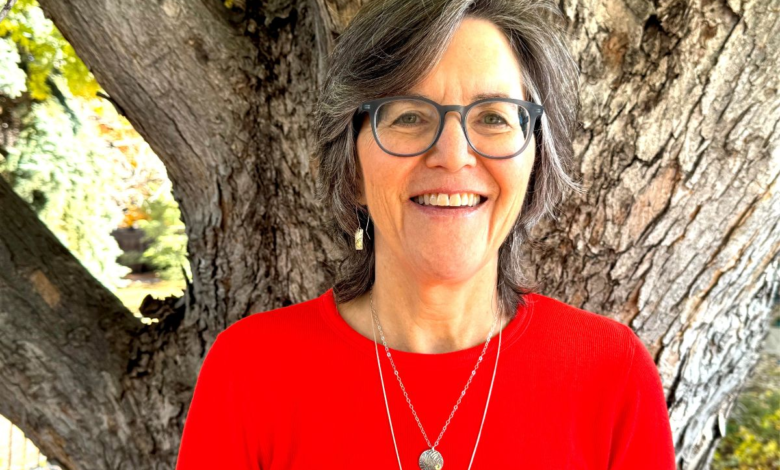R.L. Maizes wrote her novel in response to rampant cancel culture

R.L. Maizes’s debut novel, ”Other People’s Pets,” won the 2021 Colorado Book Award in Fiction. She is also the author of the short story collection ”We Love Anderson Cooper.” She lives in Niwot, Colorado, with her husband, Steve, and her muses: Rosie, a dog who spent her first year homeless in South Dakota, and the ghost of Arie the Cat.
SunLit: Tell us this book’s backstory – what’s it about and what inspired you to write it?
R.L. Maizes: “A Complete Fiction” is about a writer who takes to social media to accuse an editor of stealing the novel she submitted to him for publication, and is then herself accused of revealing her sister’s secrets in the book. The novel examines the questions: Who has a right to tell a story? And has cancel culture gone too far in our social-media obsessed world?
UNDERWRITTEN BY
Each week, The Colorado Sun and Colorado Humanities & Center For The Book feature an excerpt from a Colorado book and an interview with the author. Explore the SunLit archives at coloradosun.com/sunlit.
I wrote the book because it troubled me that writers were being canceled, sometimes for little to no reason. Someone would read a two-sentence description of a book and condemn it on social media. They wouldn’t have read the whole book or even a piece of it and they wouldn’t have taken the time to understand what it was about or its nuances. A book that may have taken someone a chunk of their life to write was judged on a blurb the writer hadn’t even composed themselves.
Writers were also being condemned for attempting to capture the truth of other people’s lives, for writing about subjects they’d imagined rather than lived, which is actually the job of a fiction writer, to imagine lives that are not their own. Also, like most writers, I’ve experienced ups and downs in my professional career, and I empathize with other writers who’ve experienced them.
I wanted to examine how challenging it can be to persevere as an artist in a society motivated largely by money, a society where respect is often given to those who have money and withheld from those who don’t.
“A Complete Fiction”
Where to find it:

SunLit present new excerpts from some of the best Colorado authors that not only spin engaging narratives but also illuminate who we are as a community. Read more.
SunLit: Place the excerpt you selected in context. How does it fit into the book as a whole and why did you select it?
Maizes: The excerpt is the beginning of Chapter 6. George is an editor at Peapod Press, a small publisher, and P.J. Larkin has accused him of plagiarizing the novel she submitted to him for publication. The accusation has gone viral on a trendy new social media site called Crave, putting George’s million-dollar book deal for his own novel, “Up the Hill,” at risk. Ryan is the editor-in-chief of Peapod and George’s boss.
The section gives a flavor of the book and shows the consequences that accusations on social media, founded or unfounded, can have.
SunLit: What influences and/or experiences informed the project before you sat down to write?
Maizes: I’ve been influenced by books that are both funny and make the reader think, books that take on serious subjects but aren’t afraid to entertain at the same time. Some examples would be James McBride’s “Heaven and Earth Grocery Store” and “Deacon King Kong,” two of my favorite books, and “The Trees,” by Pulitzer Prize winning author, Percival Everett. I grew up attending Wendy Wasserstein plays, and I’m still in awe of her ability to make the audience laugh and cry in the same scene.
In the book, I take on the serious subjects of cancel culture and social-media addiction, but do it in a way that I hope is entertaining. As far as experiences that informed the project, over the last decade, I observed many people being canceled, some for good reasons, great reasons even, but others over pure speculation as to what a book they wrote was about or a false allegation regarding something they did.
As a former lawyer, l’m very aware that punishing someone without giving them a chance to be heard is a violation of their rights. It’s unjust. My experiences as a writer — every depressing rejection and every joyful acceptance I’ve received — also informed the book.
SunLit: What did the process of writing this book add to your knowledge and understanding of your craft and/or the subject matter?
Maizes: I don’t think I ever really appreciated how important time is to revision before I wrote this novel. I’d heard the advice: Put the draft aside for a time before going back to it. But that’s hard. As writers, we get sick of our own work and impatient for it to be seen by others.
It was only after my agent had this book for a year and a half and submitted it unsuccessfully to more than 20 publishers that I looked at it again and had an epiphany about how to improve it. After that, I spent six months revising it in ways that vastly improved it. But a year and a half had to pass before I had the distance I needed, the “fresh eyes,” if you will, to see the novel’s potential.
SunLit: What were the biggest challenges you faced in writing this book?
Maizes: P.J., one of the main characters, is salty, to say the least. Yet I still wanted the reader to care about her. Finding ways to soften her character without changing it too much was a challenge. I didn’t want George, the other main character, to come across as too much of a victim though he is the victim in the story. Figuring out how to give him enough agency to make him interesting was a challenge.
SunLit: What do you want readers to take from this book?
Maizes: I hope readers come away from the novel with the idea that a book should never be canceled based on speculation about what’s in it, and a person shouldn’t be canceled based on a rumor that they’ve done something wrong.
Similarly, a person should think twice before instigating or joining a social-media mob. Those mobs aren’t the best ways to address claims of wrongdoing. I also tried to make the point in the book that life is better lived off of social media. That time spent time with actual friends and family is better than time spent with social media “friends.”
Lastly, I hope readers pick up on the idea that what constitutes plagiarism, beyond the simple copying of an author’s words, can be complex.
SunLit: What does the title, “A Complete Fiction,” mean?
Maizes: To start with, the book itself is fiction. It’s a novel. The title is also meant ironically. Neither of the books written by the main characters are complete fictions. George has drawn on material from his own life, and P.J. has drawn on material from her sister’s life. I would argue that hardly any novels are complete fictions.
Even if it’s just that the writer included a conversation they overheard in a coffee shop or gave the habit their uncle had of licking his mustache to a character. More likely, something very real bothered the writer and spurred them to spend years bent over a laptop.
SunLit: Tell us about your next project.
Maizes: My next project is a novel about antisemitism and vigilantism. I started writing it before the rise in antisemitic attacks around the world and right here in Colorado, where an 82-year-old Jewish woman was recently killed in Boulder. Now the novel feels even more important. The project is supported by a grant from the Memorial Foundation for Jewish Culture.
A few more quick items
Currently on your nightstand for recreational reading: Etgar Keret’s “Autocorrect” and “Family Family” by Laurie Frankel. I adore both authors’ work and aspire to write with as much humor and pathos as Laurie Frankel. Etgar Keret’s imagination goes up to 11.
First book you remember really making an impression on you as a kid: I bawled reading “Charlotte’s Web” by E. B. White, but who hasn’t? The Pippi Longstocking books by Astrid Lindgren taught me one person can make a difference by standing up. I admired Pippi then and still do.
Best writing advice you’ve ever received: Karen Shepard taught me that when you’re writing a novel, once you set a plot in motion, certain events will naturally follow, and you can just think about what those events would be to keep the story moving forward. That advice helped me write both of my published novels. Of course, there have to be surprises, too. Things that might not naturally follow.
Favorite fictional literary character: I love Six-Thirty from “Lessons in Chemistry” by Bonnie Garmus. I’ve read many animal characters, and created some, but none as brilliant as Six-Thirty. I also thoroughly enjoyed spending time with Veblen from Elizabeth McKenzie’s “The Portable Veblen” and Harold from Rachel Joyce’s “The Unlikely Pilgrimage of Harold Fry.” I’m a sucker for a well-done quirky character.
My favorite literary characters for children include Pippi Longstocking, who I’ve already mentioned, and Conrad from the children’s book “Conrad’s Castle” by Ben Shecter. The latter book is out of print, which is a terrible shame. I buy used copies when I can find them. I identify with both Pippi and Conrad.
Literary guilty pleasure (title or genre): Advice columns of any kind, from “Well” or “The Ethicist” in the “New York Times” to “Dear Nina: Conversations about Friendship,” a friendship advice column that became a wonderful podcast.
Digital, print or audio – favorite medium to consume literature: Digital because I can adjust the print size, which is important for an alter kaker like me, and because it means I always have a book with me.
One book you’ve read multiple times: I don’t reread many books. The element of surprise is so important to me in a book. In every book. Not just mysteries and thrillers. In literary and commercial fiction, too. When I reread, I miss it. Our time on this earth is so limited, and the books I want to read are so numerous, I can’t always justify to myself rereading a book.
Other than writing utensils, one thing you must have within reach when you write: Although not a “thing,” I like to have an animal or two nearby. I keep a plastic maneki-neko, beckoning cat, next to me, in case a live animal is not available. And coffee, of course.
Best antidote for writer’s block: Work in a different room or go for a walk.
Most valuable beta reader: I prefer to use a developmental editor. She’s less kind, more rigorous, and more detailed in her feedback, which she can be because she’s charging to read it.
Source link
